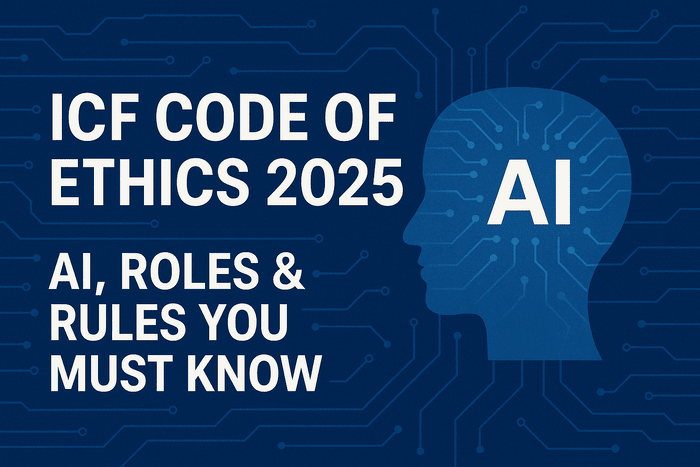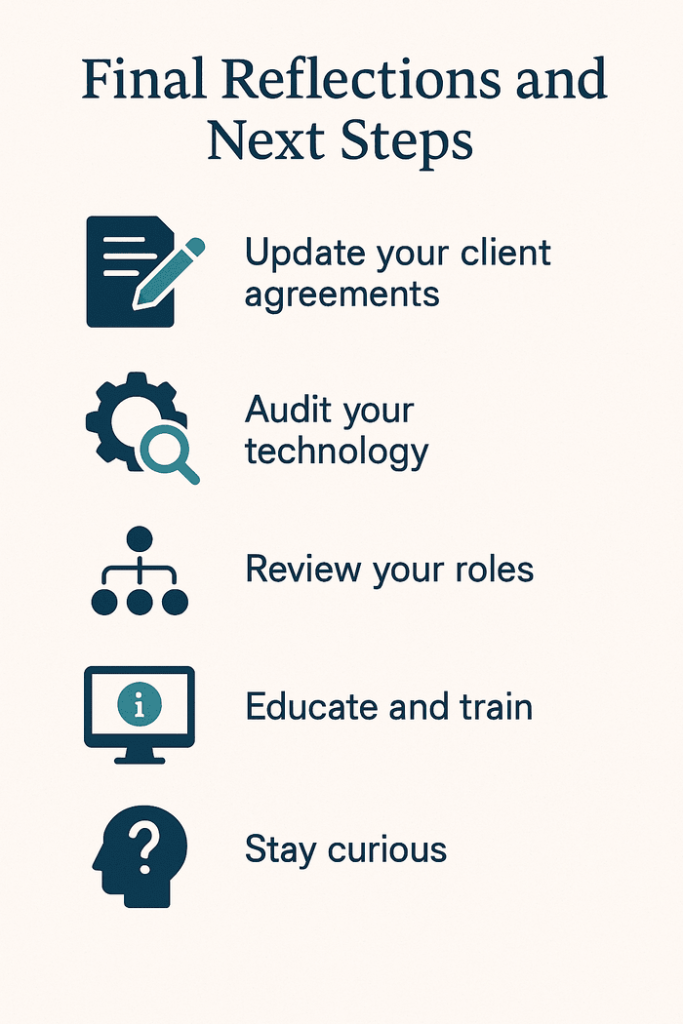
Effective strategic planning and stakeholder management are essential skills for leaders in a rapidly changing business environment. Strategic planning provides...
Ethics is the foundation of a trustworthy coaching profession. The International Coaching Federation (ICF) revises its Code of Ethics periodically to reflect evolving technologies, social norms and professional expectations. In 2025 the ICF released significant updates aimed at clarifying scope and addressing emerging challenges, such as the use of artificial intelligence and managing multiple professional roles. This guide unpacks the new standards, explains why they matter and provides practical advice to help you integrate them into your practice.

Coaching is built on confidential, collaborative relationships that empower clients to explore their goals and challenges. Without clear ethical guidelines, misunderstandings can undermine that trust. The ICF Code of Ethics exists to promote integrity, accountability and professionalism across the coaching ecosystem. It provides a common framework for coaches, sponsors, clients, educators and volunteers to navigate complex situations ethically. The ICF also emphasises that ethics is not merely about avoiding wrongdoing; it is about proactively doing good, even when it is uncomfortable. By aligning your practice with these principles, you demonstrate respect for clients, honour confidentiality and contribute to the credibility of the coaching profession.
The Code of Ethics outlines standards that all ICF professionals must follow. According to the ICF’s Insights and Considerations for Ethics document, its purpose is to support decision‑making and promote ethical awareness. It encourages coaches to co‑create agreements that clarify roles, responsibilities, confidentiality and financial arrangements. The document emphasises that ethical decision‑making is a dynamic process requiring reflection and critical thinking.
The 2025 revision reorganised the Code into five functional areas: Agreements for Client/Sponsor Engagement, Confidentiality and Legal Compliance, Professional Conduct & Conflicts of Interest, Delivering Consistent Value, and an expanded appendix for definitions. This structure improves clarity, making it easier to find relevant standards whether you’re drafting agreements, resolving conflicts or handling data. The revision also stresses that ethics apply to any interaction, digital or in person, and across international jurisdictions—a key consideration for coaches working virtually.
One of the most important changes in the 2025 Code is its broader scope. Previously some individuals in the coaching ecosystem were uncertain whether the Code applied to them. The updated version explicitly includes anyone operating within the ICF ecosystem. Those bound by the Code now include:
This inclusive approach eliminates ambiguity. Even if you are not an ICF member or credential‑holder, you must comply if you represent ICF in any capacity. The change also reinforces the message that ethics is a shared responsibility, not confined to a small group of practitioners. It promotes consistency and raises the ethical bar across the global coaching landscape.
The rise of artificial intelligence (AI) in coaching—through transcription tools, scheduling assistants and analytics—prompted the introduction of Standard 2.5. According to the Erickson Coaching article breaking down the changes, this standard requires ICF professionals to disclose the use of AI and ensure that clients’ interests are protected. In practical terms:
The ICF’s Insights document adds further guidance on AI. It states that coaches must obtain informed consent when using any technology systems, including AI. Coaches are responsible for researching the risks of the tools they use and ensuring confidentiality. They must understand the policies of any third‑party platforms and share this information with clients so they can make informed decisions. As a professional, you cannot abdicate responsibility by blaming the platform; you are accountable for your choice of technology.
AI tools can enhance efficiency and accuracy, but they also introduce privacy and data‑protection risks. Automatic recordings may capture sensitive information without explicit awareness. Some software providers analyse recordings to train algorithms, raising questions about who owns and controls the data. By disclosing AI use up front, you respect clients’ autonomy and foster trust. Disclosure also invites dialogue about alternatives—such as opting out of transcription—or setting boundaries around data retention. This conversation empowers clients and helps you stay ahead of regulatory changes in data privacy and AI ethics. Ultimately, Standard 2.5 reinforces the notion that technology should augment, not replace, human judgment and empathy.
Another major update introduces Standard 3.7, which addresses situations where coaches wear multiple professional hats. The standard requires ICF professionals to disclose when they are acting in more than one role with a client or within the client’s organisation. Examples include acting as both a coach and a trainer, therapist, consultant, HR manager or mentor. The guideline specifies:
This standard recognises that many coaches operate in complex organisational settings. Without clear boundaries, clients may feel confused about the nature of interactions. Disclosing multiple roles promotes transparency and allows clients to make informed decisions about continuing the relationship. It also protects coaches from inadvertently violating confidentiality or professional guidelines associated with their other roles.
Beyond new standards, the 2025 Code reorganises ethical categories into five sections to improve usability. Each category contains multiple standards:
This reorganisation makes it easier to locate relevant guidance. For example, if you are concerned about confidentiality and AI, you go straight to Section 2.5. If you are negotiating a contract with a corporate sponsor, Section 1 provides detailed insights on agreements.
The inclusion of AI in the Code reflects a broader conversation about technology’s role in coaching. While Standard 2.5 focuses on disclosure, ethical AI use involves more than compliance. Consider adopting these best practices:
By taking proactive steps, you go beyond merely meeting the letter of the standard; you embody the spirit of ethical practice in a digital age.
Coaches often juggle roles—trainer, consultant, manager, mentor. While this versatility can be valuable, it poses ethical risks. Conflicts of interest can arise when responsibilities to different stakeholders collide. For instance, as an internal coach you might be asked to provide feedback to HR on an employee you also coach. Such situations require careful navigation:
Standard 3.7 reminds us that professionalism includes clear boundaries. By anticipating potential conflicts and communicating proactively, you protect your clients and your integrity.
Ethical practice is more than following rules; it is an ongoing commitment to integrity. Here are practical steps to integrate the ICF Code of Ethics into your daily work:
By embedding these practices, you create a culture of ethics that permeates your interactions. Clients, sponsors and colleagues will perceive you as a trustworthy professional who prioritises their well‑being.
Background: A coach uses an AI transcription service during sessions to generate notes. Previously they did not inform clients.
Application of Standard 2.5: Under the 2025 Code, the coach must disclose the use of AI and explain how the data will be stored and who has access. They also need to obtain informed consent. In practice, the coach informs the client at the start of the engagement, describes the tool’s function and privacy settings, and offers alternatives (e.g., manual note‑taking). The client appreciates the transparency and opts in.
Outcome: By sharing this information, the coach strengthens trust and ensures they comply with confidentiality standards. They also schedule regular reviews of AI tools’ policies to stay updated.
Background: A consultant also coaches executives at the same company where she designs leadership training programmes. Occasionally, clients ask for advice beyond coaching.
Application of Standard 3.7: The consultant/coach discloses her dual roles up front, clarifying that coaching conversations are confidential and distinct from training feedback. If a client requests consulting advice during a coaching session, she pauses to remind them of the boundaries and asks whether they want to shift into a consulting conversation. She documents the client’s consent.
Outcome: By clearly delineating roles, the coach avoids conflict of interest and maintains the integrity of both services. The client feels empowered to choose the type of support they need.
Background: A coach uses an online platform to schedule sessions and record notes. The platform suffers a data breach, exposing confidential client information.
Ethical Considerations: According to the Insights document, coaches are responsible for researching tools and understanding their data policies. In this case, the coach contacts affected clients, discloses the breach, and discusses steps to mitigate harm. They review the platform’s security measures, report the incident to the ICF Ethical Conduct Review if necessary, and consider switching to a more secure provider.
Outcome: By acting promptly and transparently, the coach honours their ethical obligations and maintains trust, despite the unfortunate event.
The 2025 ICF Code of Ethics reflects the dynamic nature of coaching. Expanding the scope of who must comply, introducing standards on AI and multiple roles, and reorganising the Code into clear categories help professionals navigate an increasingly complex landscape. Ethical practice is not a static checklist; it is a living commitment to integrity, transparency and client welfare. By embracing the updated standards—disclosing AI use, clarifying roles, strengthening agreements and staying informed—you demonstrate respect for clients and elevate the profession.
As you integrate these rules, remember that ethics are rooted in values. Seek feedback, engage in reflective practice and remain curious about emerging issues. Whether you are a seasoned coach, a volunteer or a training coordinator, the updated Code offers a roadmap for ethical excellence. Use it as a foundation to build trusting relationships and to champion a coaching culture that prioritises people over profit and process.
While Standards 2.5 and 3.7 capture high‑profile issues like AI and dual roles, the ICF Code contains other confidentiality and compliance provisions that are equally vital. Standard 2.4 directs coaches to maintain, store and dispose of records—including electronic files—in a manner that promotes confidentiality, security and privacy. This means using encrypted storage, secure transfer methods and clear retention policies. Coaches should obtain consent before recording sessions and inform clients who will have access to those recordings. Failure to disclose could breach trust or even violate privacy laws.
Standard 2.6 emphasises that coaches are responsible for ensuring that support personnel adhere to ethical standards. Support personnel include administrative assistants, translators, transcription services and technology providers who may handle client information. Coaches should brief them on confidentiality obligations, have them sign agreements and monitor compliance. As the Insights document notes, the ICF’s Ethical Conduct Review Board may examine how a coach manages support staff if a complaint arises.
Standard 2.7 requires maintaining the privacy of fellow ICF professionals. You must not use another coach’s contact details for marketing without permission. This reflects respect for colleagues and protects them from unwanted solicitations. Combined, these standards emphasise that confidentiality is not a one‑off task; it permeates every aspect of practice, from record‑keeping to professional relationships.
The Insights document warns about other technologies that can inadvertently compromise confidentiality. Smart speakers like Alexa or Siri may record conversations, so coaches should discuss these risks with clients and decide whether to disable them during sessions. Social media is another area of concern: coaches should never share identifying information or client stories without explicit permission. Even seemingly harmless posts can reveal confidential details or misrepresent the coaching relationship. By proactively addressing these issues, you create an environment where clients feel safe and understood.
The ICF Code acknowledges that coaching often spans borders, both physically and virtually. Coaches may work with clients from different countries, each with its own data protection laws, cultural norms and professional expectations. The Insights document recommends explicitly defining which legal framework governs your coaching agreement. For example, a coach in India working with a client in Germany must decide whether Indian law, German law or an international agreement applies in case of disputes. Clarifying this in writing protects both parties.
Cultural differences also shape ethical expectations. In some cultures, clients may expect a coach to provide direct advice, while in others the coach is expected to remain strictly non‑directive. Disclosure of multiple roles becomes especially important in collectivist cultures where roles may overlap. Similarly, the concept of privacy differs across societies. Coaches must educate themselves on cultural norms and adjust their communication. When in doubt, asking clients about their expectations fosters respect and avoids misinterpretation.
Cross‑border coaching also raises questions about data storage. Cloud services may store information in multiple countries. Coaches should review where their service providers host data and whether those locations comply with the legal requirements of all involved parties. The GDPR in Europe, for instance, imposes strict rules on data transfers outside the European Economic Area. Ethical practice includes staying informed about such regulations and obtaining legal advice when necessary.
Integrating the 2025 Code into your practice requires ongoing reflection. An ethical self‑assessment is a powerful tool to identify strengths and areas for improvement. Consider scheduling quarterly reviews where you ask yourself questions such as:
Answering honestly helps you identify gaps. You might discover that your client agreements lack explicit data retention clauses or that you need to clarify how you would manage a conflict between your coaching role and another professional role. Document your findings and create an action plan. As part of this process, seek feedback from peers or mentors. External perspectives often reveal blind spots.
Delivering consistent value is one of the ethical categories emphasised in the 2025 Code. This includes maintaining competence through ongoing education. Coaching is a dynamic profession; new research emerges, cultural contexts change and technologies evolve. Staying current ensures that you offer clients the best possible support. Attend webinars on topics like diversity, equity and inclusion; enrol in courses on emerging coaching methods; and participate in peer supervision groups. The ICF offers resources and communities where you can discuss ethical challenges and learn from others’ experiences. Continuous learning also involves self‑care. Ethical practitioners recognise their own limits and seek support when they encounter complex cases. Rest, reflection and personal development are essential to avoid burnout and maintain high standards.
The updated ICF Code of Ethics underscores the importance of transparent agreements, confidentiality, responsible use of AI and clarity around multiple professional roles. As you absorb these ethical guidelines, consider how your training program will prepare you to embody them. Effective coaching education doesn’t just teach techniques—it instils ethical decision‑making, equips you to navigate AI tools responsibly and clarifies boundaries when serving clients in multiple capacities. When evaluating programs, look for curricula that explicitly cover the ICF Code of Ethics, incorporate case studies on AI and data privacy, and provide mentor feedback on ethical dilemmas. Also assess whether the program’s culture encourages reflective practice and accountability. To streamline your search, consult Erickson’s 2026 comparison guide, which compares leading ICF programs in India and highlights how each integrates ethics training, technology considerations and mentoring. This resource will help you choose a program that not only meets ICF accreditation standards but also equips you to uphold the highest ethical standards in your coaching practice.
Some coaches view ethics as a regulatory obligation, but it is also a powerful business asset. In a profession built on trust, your reputation is one of your most valuable resources. Adhering to ethical standards signals reliability. Clients are more likely to refer others when they feel respected and safe. Sponsors and corporate partners look for coaches who can navigate complex organisational dynamics with integrity. Transparent disclosure of AI use and dual roles demonstrates maturity and foresight, setting you apart from competitors. In contrast, ethical violations—such as sharing client stories without permission or failing to obtain consent for recordings—can damage your credibility and lead to complaints or legal action.
Marketing your services ethically also means avoiding misleading claims. Do not promise guaranteed outcomes or exaggerate your experience. Be clear about your credentials and the methodologies you use. The ICF Code reminds professionals to manage expectations honestly. In the long run, integrity fosters sustainable success. Clients appreciate authenticity and are more likely to stay engaged when they feel their coach acts in their best interest.

The 2025 updates to the ICF Code of Ethics reflect the complexity of modern coaching. By expanding the scope to include more roles, addressing AI and clarifying the responsibilities associated with multiple hats, the ICF provides a robust framework for ethical decision‑making. The guidelines on confidentiality, legal compliance and continuous improvement underscore that ethics permeate every facet of coaching practice. Embracing these standards is not simply about compliance; it is about building relationships grounded in respect, transparency and empowerment.
To embed the Code in your practice:
By following these steps and cultivating an attitude of ethical curiosity, you contribute to a profession that not only helps individuals achieve their goals but also upholds the dignity and rights of all involved. The 2025 Code is more than a rulebook; it is an invitation to elevate coaching as a force for positive change. Accepting this invitation can transform your practice and inspire confidence in those you serve.
The 2025 ICF Code of Ethics promotes integrity, accountability, and professionalism across the coaching ecosystem. It provides a framework for ethical decision-making, ensuring trust in client relationships and addressing modern challenges like AI and multiple roles.
The Code applies to everyone in the ICF ecosystem, including credentialed coaches, coaches in training, educators, mentors, supervisors, personal assistants, volunteers, board members, task force members, and ICF staff, ensuring consistent ethical standards.
Standard 2.5 requires coaches to disclose AI use (e.g., transcription tools), obtain informed client consent, and protect client interests by ensuring confidentiality and understanding data policies of AI platforms.
Standard 3.7 mandates disclosing when coaches hold multiple roles (e.g., coach and trainer) with a client or organization, obtaining consent, and managing potential conflicts to maintain transparency and avoid bias.
Coaches should update client agreements to include AI and role disclosures, audit technology for data security, train support staff on ethics, seek continuous education, and conduct regular ethical self-assessments to ensure compliance and build trust.

Effective strategic planning and stakeholder management are essential skills for leaders in a rapidly changing business environment. Strategic planning provides...

Change Management & Digital Transformation: Build Adaptive Leaders with Erickson Coaching Rapid technological advances, shifting customer expectations and global disruption...

Discover how Erickson’s solution‑focused coaching delivers up to 788 % ROI and drives operational excellence by improving strategic thinking, communication and...

The coaching profession has moved from the margins to the mainstream. Recent global studies show that the number of professional...

India’s economy has transformed dramatically over the last decade, and the demand for top business coach India services has grown...

When searching for a certified life coach program price, it’s natural to start by comparing tuition fees. Aspiring coaches want...

Neuro-Linguistic Programming (NLP) is experiencing a resurgence in India. Social media, workshops and high-energy seminars promise instant breakthroughs by rewiring...

Many professionals pursue the title of Certified Organizational Development Coach with the expectation that a credential alone will open corporate...

Some providers offer to fast-track you to PCC status through purely online modules for a fraction of the cost of...